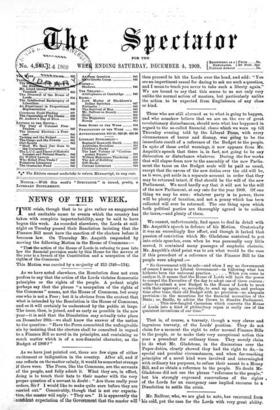We cannot, unfortunately, find space to deal in detail with
Mr. Asquith's speech in defence of his Motion. Oratorically it was an exceedingly fine effort, and though it lacked that passion of conviction which Mr. Gladstone contrived to put into crisis speeches, even when he was personally very little moved, it contained many passages of emphatic rhetoric. Mr. Asquith's chief point was to ask what would be the case if this precedent of a reference of the Finance Bill to the people were adopted :- " No Government will be safe—and when I say no Government of course I mean no Liberal Government—in following what has hitherto been the universal practice. . . . . . When you come to analyse it, it means that the House of Lords will have the power to compel the Executive of the day to adopt one of three courses : either to submit a new Budget to the House of Lords to meet with their approval ; or, secondly, to send up again, and perhaps time after time, their old 13udget with no provision—no adequate provision—in the meantime for the financial necessities of the State ; or, finally, to advise the Crown to dissolve Parliament.
This new-fangled Caesarism which converts the House of Lords into a kind of plebiscitary organ is really one of the quaintest inventions of our time."






































































 Previous page
Previous page